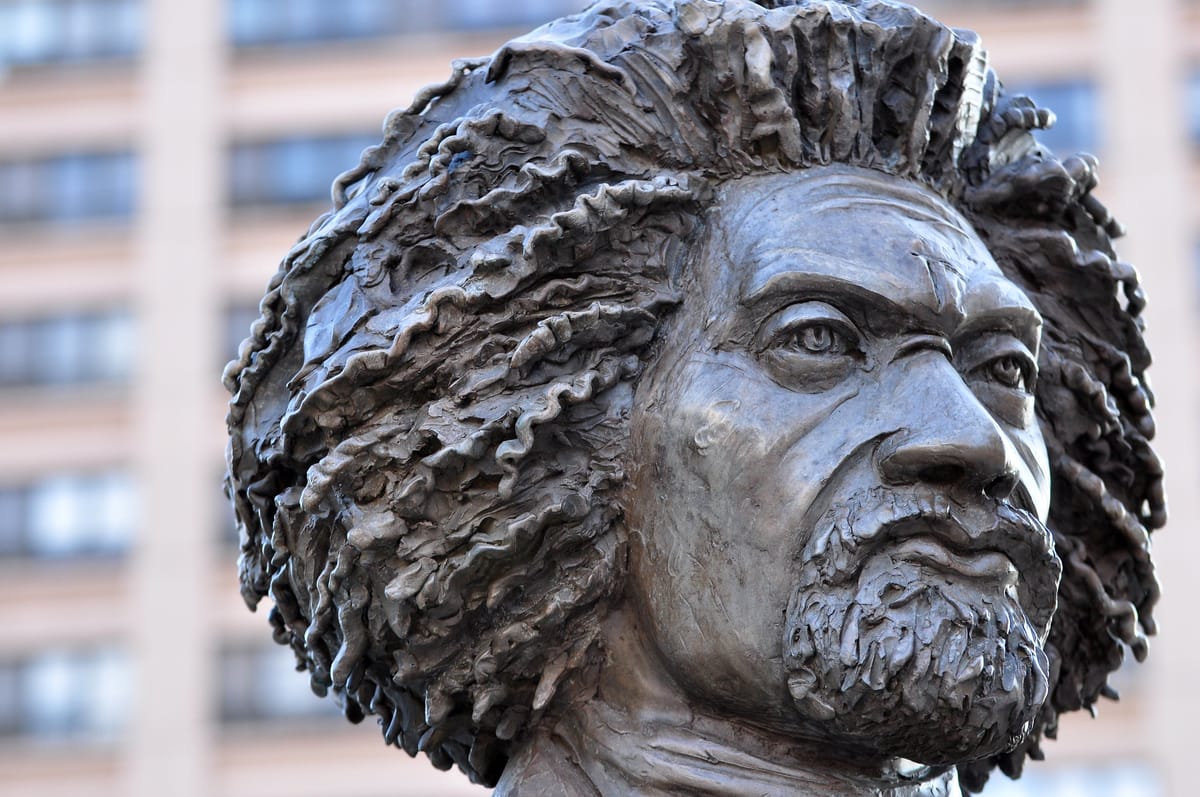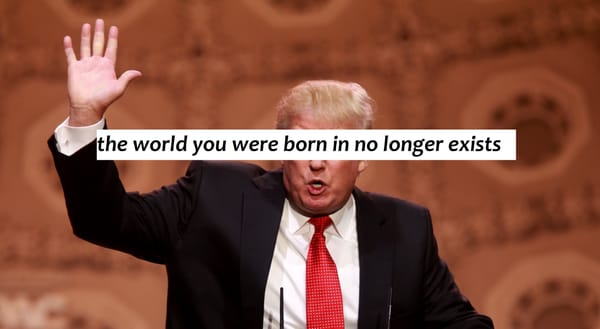Is Civil Government Right?
With all the drawbacks upon government which fancy can depict, or imagination conjure up, society possessing it, is as paradise to pandemonium, compared with society without it.

The following essay by Frederick Douglass was originally published in Frederick Douglass’ Paper, October 23, 1851. It is a response to an argument by Henry C. Wright against abolitionist engagement with electoral politics. Scanned PDFs of the issue containing both the Douglass and the Wright essays are available from the Library of Congress here.
Is Civil Government Right?
This question is raised and summarily disposed of in a letter, which appears in another column, addressed by Mr. Wright to Gerrit Smith, Esq. The writer thinks a just civil government “an impossibility.” He does not, in this, object to the abuses of power, but to the power itself, and he classes the assumed right of government with robbery, piracy and slavery. “To speak of a righteous human ruler is the same as to speak of a righteous thief, a righteous robber, a righteous murderer, a righteous pirate or a righteous slaveholder.”
To those unacquainted with Mr. Wright’s style, this letter will seem an outburst of unusual extravagance on his part; but we must pronounce it tame as compared with many of his productions, on this and on kindred subjects. There is in it an absence of startling assertion, and an attempt at reasoning such as Mr. Wright does not always condescend to in dealing with opponents. We, therefore, take pleasure in laying his letter before our readers, that they may have both sides of a subject which is to them, and to us, one of unspeakable interest.
Were we to presume to criticize Mr. Wright’s letter, we should object to his limited statement of the assumed right upon which civil government is based. He says, “the assumption is, that man is invested by God with power to dictate law to man and to punish him if he do not obey.”
To this statement we object, that the vital principle of government is left out. It contains the skeleton, but the life is not there. The bones and sinews are retained, but the vital spark which should animate them is gone. Were we to make an inquiry into the rightfulness of civil government, we should (perhaps owing to the diffuseness of our intellect) begin by assuming, first, that man is a social as well as an individual being; that he is endowed, by his Creator, with faculties and powers suited to his individuality and to society. Second, that individual isolation is unnatural, unprogressive and against the highest interests of man; and that society is required, by the natural wants and necessities inherent in human existence. Third, that man is endowed with reason and understanding capable of discriminating between good and evil, right and wrong, justice and injustice. Fourth, that while man is constantly liable to do evil, he is still capable of apprehending and pursuing that which is good; and that, upon the whole, his evil tendencies are quite outweighed by the powers within him, impelling him to good. In a word, that crime is the exception, and innocence is the rule of human nature. Fifth, that rewards and punishments are natural agents for restraining evil and for promoting good, man being endowed with faculties keenly alive to both. Finally, that whatever serves to increase the happiness, to preserve the well-being, to give permanence, order and attractiveness to society, and leads to the very highest development of human perfection, is, unless positively prohibited by Divine command, to be esteemed innocent and right. The question then comes, Is human government right? Mark, the question is not, Is arbitrary, despotic, tyrannical, corrupt, unjust, capricious government right? but is society (that is a company of human beings) authorized by their Creator to institute a government for themselves, and to pass and enforce laws which are in accordance with justice, liberty and humanity? Mr. Wright says that they have not. His reasons are, that “to admit the rightfulness of such government is to admit that human will or discretion is the only tenure by which we hold life, liberty or happiness. That the existence of each one is at the discretion of each and every other. That we must all live or die, be slaves or freemen, be happy or miserable, by act of Congress or Parliament,” and much more in the same strain. (See letter.)
From a conclusion so revolting and terrible, he, naturally enough, recoils with a shudder. The fallacy and fatal error which form the basis of this reasoning, are the assumptions that human government is necessarily arbitrary and absolute; and that there is no difference between a righteous and a wicked government. Human government, from its very nature, is an organization, like every other human institution, limited in its powers, and subject to the very wants of human nature which call it into existence. A community of men who will organize a government, granting it the power to make them slaves or freemen, to kill them or let them live, to make them happy or miserable at discretion, are in a pitiable condition, and far behind the Liberty Party in right apprehensions of the nature and office of civil government.
“But,” says Mr. Wright, “if a man may rightfully tell his fellow-beings how to act, he may tell them how to speak, how to feel, and how to think.” Well, what of it? Mr. Wright is constantly telling men how to act, how to think, how to feel, and how to speak; and it would be well for the world if it followed some of his telling at least. But we apprehend that the objection to government does not consist in its telling men how to think, speak, feel or act, but in the punishment which government may see fit to inflict, and that involves the question of the rightfulness of physical force, of which we shall speak anon. Mr. Wright does not object to societies expressing by their votes their dissent or approval of the thoughts, sayings, feelings and actions of men. He, doubtless, deems this proper and praiseworthy; nor does he, as we understand him, object to the principle that majorities ought to rule; at any rate, he certainly cannot think that the minority of the members of the American Anti-Slavery Society ought to adopt measures which are condemned by the majority. Why is this respect to be shown to the majority? Simply because a majority of human hearts and intellects may be presumed, as a general rule, to take a wiser and more comprehensive view of the matters upon which they act than the minority. It is in accordance with the doctrine that good is the rule, and evil the exception in the character and constitution of man. If the fact were otherwise (that is, if men were more disposed to evil than to good), it would, indeed, be dangerous for men to enter into a compact, by which power should be wielded by the mass, for then evil being predominant in man, would predominate in the mass, and innumerable hardships would be inflicted upon the good. The old assertion of the wickedness of the masses, and their consequent unfitness to govern themselves, is the falsehood and corruption out of which have sprung the despotic and tyrannical conspiracies, calling themselves governments, in the old world. They are founded not in the aggregate morality and intelligence of the people, but in a fancied divine authority, resulting from the inherent incompetency of the people to direct their own temporal concerns. Kings and despots flourish in such a soil, poisoning the moral atmosphere with oppression and paralyzing the spirit of progress by choking the utterance of free speech from the platform and the press. It is confounding such government with a righteous democratic government, and charging the crimes of the former upon the latter, that has led such men as Mr. Wright to array themselves against the Liberty Party.
But how different is the ground assumed by Gerrit Smith and his associates, from that upon which despotic governments are based. The one assumes that the people may be trusted, and the other, that no confidence can be placed in them. The one that the people, the whole people, should have a voice in making the laws under which they live, and the other, that the people should have nothing to do with the laws but to obey them; or (to use a favorite sentiment of Mr. Wright) one regards institutions for men, and the other regards men for institutions. But it is alleged that the power claimed for government by the Liberty Party, is, in essence, the same as that which is claimed by despots, and is, therefore, to be rejected. This allegation is unfounded, since there is all the difference between the cases, that exists between limited and restricted power, and power unlimited and unrestricted. In the one case, the governing power is in the hands of the people, who are supposed to know their rights and to understand their interests; and in the other, the governing power is in the hands of an individual, who, from his very circumstances and environments, can be supposed to have very little sympathy with the people, or very little desire to promote their intelligence as to their best interests.
Mr. Wright will, however, insist that the exercise of governmental power is practically the same, whether it be wielded by King Individual or King Majority; that the will, caprice, or what not, of the majority is as imperious in its tone, and must be as implicitly obeyed as that of the king.
The answer is, that the Liberty Party concedes no governmental authority to pass laws, nor to compel obedience to any laws, against the natural rights and happiness of man. It affirms that the office of government is protection; and when it ceases to protect the rights of man, they repudiate it as a tyrannical usurpation. But our friend asks, “Who is to decide?” We answer, the constitution and the common sense of the people, manifested in the choice of their lawmakers. It may still be further asked, will they always decide rightly? They may not, for the individual does not always decide for himself what is for his best interest. What then? Shall we abolish the individual, and deny him the right to govern himself because he may sometimes govern wrongly? The reasoning which would deny the right of society to frame laws for its own protection, preservation and happiness, would, if rigidly adhered to, deny to man the right to govern himself; for is he not a frail mortal, and has he any more right to ruin himself than he has to ruin others? But again, the very fact that a government is instituted by all, and rests upon all for support and direction, is the strongest guarantee that can be given that it will be wielded justly and impartially. With all the drawbacks upon government which fancy can depict, or imagination conjure up, society possessing it, is as paradise to pandemonium, compared with society without it.
Mr. Wright objects to civil government because “there is no crime which man may not and will not perpetrate against man.” A strange reason against government truly. We use the fact in favor of government, not against it. Because there are hardened villains, enemies to themselves and to the well-being of society, who will cheat, steal, rob, burn and murder their fellow-creatures, and because these are the exceptions to the mass of humanity, society has the right to protect itself against their depredations and aggressions upon the common weal. Society without law, is society with a curse, driving men into isolation and depriving them of one of the greatest blessings of which man is susceptible. It is no answer to this to say that if all men would obey the laws of God, lead virtuous lives, do by others as they would be done unto, human government would be unnecessary; for it is enough to know, as Mr. Wright declares, that “there are no crimes which man may not and will not perpetrate against his fellow-man,” to justify society in resorting to force, as a means of protecting itself from crime and its consequences.
If it be alleged that to repel aggression by force is to promote aggression; and that to submit to be robbed, plundered and enslaved is the true way to establish justice and liberty among men, the answer is, that the theory is contradicted by the facts of human nature, and by the experience of men in all ages. The present condition of the slave population of this country is a striking illustration of the fallacy that submission is the best remedy for the wrongs and injustice to which they are subjected. Here we have two hundred years of non-resisting submission, and equally two hundred years of cruel injustice; and so far from this submission serving as a remedy for the frightful injustice, it is urged by the oppressors as a reason for persisting in their course. Concessions do but lead to exactions, and submission, to the imposition of still greater hardships, and this is the lesson taught by the facts of human nature, and by the history of the world. Men need to be taught, not only the happy consequences arising from dealing justly, but the dreadful consequences which result from injustice; their fears, therefore, may be as legitimately appealed to as their hopes, and he who repudiates such appeals, throws away an important instrumentality for establishing justice among men, and promoting the peace and happiness of society. All tyrants, all oppressors should be taught, by precept and by example, that, in trampling wantonly and ruthlessly upon the lives and liberties of their unoffending brother-men, they forfeit their own right to liberty, and richly deserve the slavery and death that they inflict upon others. Mr. Wright may say that the slave should appeal to the humanity and to the sense of justice of his master, and thus overcome evil with good; but, once enslaved, the master may forbid such an appeal; for, to use the language of Mr. Wright, the power claimed is such as may enable the slave-holder to tell his slave, not only “how to act,” but how to speak, think and feel; and he may deprive his victim of every means of reaching his sense of justice, except through his bodily fears. This, then, is our reasoning: that when every avenue to the understanding and heart of the oppressor is closed, when he is deaf to every moral appeal, and rushes upon his fellow-man to gratify his own selfish propensities at the expense of the rights and liberties of his brother-man, the exercise of physical force, sufficient to repel the aggression, is alike the right and the duty of society.
Truth may withstand falsehood, love may overcome hatred, opinion may be opposed to opinion, the theory of liberty may be opposed to slavery, and common sense alike teaches that physical resistance is the antidote for physical violence.
It is asked, in view of these conclusions, when will wars cease? We answer, when man shall learn to respect the rights of man: “first pure, then peaceable.” There can be no peace while there is oppression. The true way to give peace to the world is, to establish justice in the world; and regarding righteous civil government as an important means to this great end, we unhesitatingly and heartily consecrate ourselves, within our humble sphere, to its advocacy.




